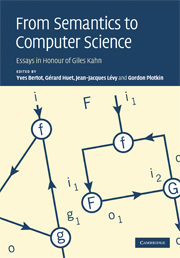Book contents
- Frontmatter
- Contents
- List of contributors
- Preface
- 1 Determinacy in a synchronous π-calculus
- 2 Classical coordination mechanisms in the chemical model
- 3 Sequential algorithms as bistable maps
- 4 The semantics of dataflow with firing
- 5 Kahn networks at the dawn of functional programming
- 6 A simple type-theoretic language: Mini-TT
- 7 Program semantics and infinite regular terms
- 8 Algorithms for equivalence and reduction to minimal form for a class of simple recursive equations
- 9 Generalized finite developments
- 10 Semantics of program representation graphs
- 11 From Centaur to the Meta-Environment: a tribute to a great meta-technologist
- 12 Towards a theory of document structure
- 13 Grammars as software libraries
- 14 The Leordo computation system
- 15 Theorem-proving support in programming language semantics
- 16 Nominal verification of algorithm W
- 17 A constructive denotational semantics for Kahn networks in Coq
- 18 Asclepios: a research project team at INRIA for the analysis and simulation of biomedical images
- 19 Proxy caching in split TCP: dynamics, stability and tail asymptotics
- 20 Two-by-two static, evolutionary, and dynamic games
- 21 Reversal strategies for adjoint algorithms
- 22 Reflections on INRIA and the role of Gilles Kahn
- 23 Can a systems biologist fix a Tamagotchi?
- 24 Computational science: a new frontier for computing
- 25 The descendants of Centaur: a personal view on Gilles Kahn's work
- 26 The tower of informatic models
14 - The Leordo computation system
Published online by Cambridge University Press: 06 August 2010
- Frontmatter
- Contents
- List of contributors
- Preface
- 1 Determinacy in a synchronous π-calculus
- 2 Classical coordination mechanisms in the chemical model
- 3 Sequential algorithms as bistable maps
- 4 The semantics of dataflow with firing
- 5 Kahn networks at the dawn of functional programming
- 6 A simple type-theoretic language: Mini-TT
- 7 Program semantics and infinite regular terms
- 8 Algorithms for equivalence and reduction to minimal form for a class of simple recursive equations
- 9 Generalized finite developments
- 10 Semantics of program representation graphs
- 11 From Centaur to the Meta-Environment: a tribute to a great meta-technologist
- 12 Towards a theory of document structure
- 13 Grammars as software libraries
- 14 The Leordo computation system
- 15 Theorem-proving support in programming language semantics
- 16 Nominal verification of algorithm W
- 17 A constructive denotational semantics for Kahn networks in Coq
- 18 Asclepios: a research project team at INRIA for the analysis and simulation of biomedical images
- 19 Proxy caching in split TCP: dynamics, stability and tail asymptotics
- 20 Two-by-two static, evolutionary, and dynamic games
- 21 Reversal strategies for adjoint algorithms
- 22 Reflections on INRIA and the role of Gilles Kahn
- 23 Can a systems biologist fix a Tamagotchi?
- 24 Computational science: a new frontier for computing
- 25 The descendants of Centaur: a personal view on Gilles Kahn's work
- 26 The tower of informatic models
Summary
Abstract
The purpose of the research reported here was to explore an alternative way of organizing the general software structure in computers, eliminating the traditional distinctions between operating system, programming language, database system, and several other kinds of software. We observed that there is a lot of costly duplication of concepts and of facilities in the conventional architecture, and believe that most of that duplication can be eliminated if the software is organized differently. This article describes Leordo, an experimental software system that has been built in order to explore an alternative design and to try to verify the hypothesis that a much more compact design is possible and that concept duplication can be eliminated or at least greatly reduced. Definite conclusions in those respects can not yet be made, but the indications are positive and the design that has been
Introduction
Project goal and design goals
Leordo is a software project and an experimental software system that integrates capabilities that are usually found in several different software systems:
in the operating system
in the programming language and programming environment
in an intelligent agent system
in a text formatting system
and others more. I believe that it should be possible to make a much more concise, efficient, and user-friendly design of the total software system in the conventional (PC-type) computer by integrating capabilities and organizing them in a new way.
- Type
- Chapter
- Information
- From Semantics to Computer ScienceEssays in Honour of Gilles Kahn, pp. 309 - 336Publisher: Cambridge University PressPrint publication year: 2009



